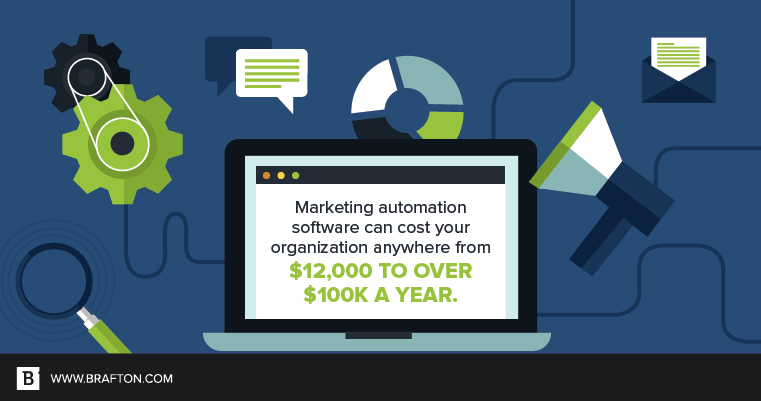What does your company’s content marketing strategy cost? What’s the price you pay if you swing and miss?
Most marketers judge their performance on traffic, clicks and leads (amongst many other metric-driven factors). However, it can be hard for a B2B organization to know what the revenue implications are from their content marketing strategy.
It’s hard to keep track of all this stuff, but you need to!
For example, how much is your company spending on marketing automation software? How many campaigns are run each quarter? Each month? When was the last time you updated the content in those campaigns? Who is responsible for content creation and management? Marketing automation software can cost your organization anywhere from $12,000 a year to over $100,000. Do you have answers to these questions? Your boss will be asking them.

Many companies are paying a premium for multiple products that are underutilized or populated with outdated content. It’s crucial for the content that powers these products to be regularly updated for each campaign with dynamic and thought-provoking material that will earn an audience. Creating and executing these strategies takes time and effort from your best marketing employees. This can include identifying and building personas, creating content at different stages of the buying cycle and analyzing the results.
Now rinse and repeat.
As you calculate all the expenses that go into doing content marketing properly, the tab starts to add up quickly: Time and salary of my marketing team + marketing automation software + writers + graphics designers + videographers = a lot more than you likely think. Now imagine that all this time and money was wasted on a campaign that did not deliver leads.

- Running campaigns that don’t work? Say goodbye to your marketing budget.
Here are some tips to limit the risk:
Plan ahead
Create a diverse content calendar that hits multiple areas of a buying cycle (unaware, aware, ready to buy). Within each part of the funnel, content should serve a purpose and answer a question for the reader. Campaigns need to drive prospects through the buyers’ journey with up-to-date and unique content.
Provide insight
Few people like being “sold.” The best way to earn the trust of your reader is to offer information that isn’t readily known or available in the industry. Providing quality industry insight separates you out from all the other voices vying for the reader’s attention. This is not easy, but when done properly it yields dramatic results. What does your content provide that can’t be found on 10, 20 or 30 other sites? What makes your organization unique?
Create compelling landing pages
A piece of content is only as good as the landing page that it lives on. Does your landing page answer the intent of the searcher that lands on it? Does it follow all SEO best practices? Do you have graphics or videos that help explain the value of your solution?
Seek input from all levels of the organization
The goals of a CEO can be different than that of a marketing manager. Creating content that speaks to all potential buyers is important in generating leads. Know your buyer personas and get input from the appropriate people internally that represent each buyer. Who better to talk to a CEO than a CEO?
Dive into your data
Content marketing is a science. A CEO of an organization recently told me, “Well, it’s all a crap shoot anyway. Nobody knows what will work and what won’t.” This is false. Use data to set yourself up for success. Do not target the most competitive keyword if you don’t already own that space. Find quality visitors by targeting long tail keywords that relate back to the content piece or landing page that you are driving traffic to.
Don’t be afraid to adjust on the fly
A/B test language. Capitalize on successful campaigns or content pieces. Pull the plug on an underperforming PPC campaign. Just because it was the plan doesn’t make it right. Don’t double down on failure, and instead be prepared to shift quickly if the campaign doesn’t hit the mark.
Content marketing isn’t easy. Failures can cost an organization money and time in the form of lost leads/sales and wasted effort from some of your best/most expensive people. Before starting a campaign, if you can confidently answer some of the questions above, you will limit the risk to your company.





